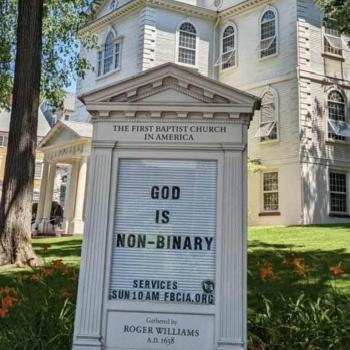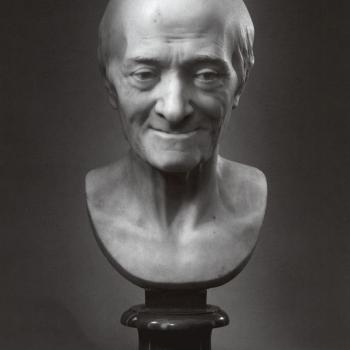Over the past several years, I have found myself in frequent conversations with conservative Christians, most frequently on this blog, about a number of different issues. These conversations often are focused on the practical implications of the Christian faith—how might one expect one’s Christian faith to work out in real time? For instance, what sorts of political and social positions might a serious Christian faith lead one to?
As you might imagine, these conversations have been interesting, to say the least. This site is frequently trolled by conservative Christians who make sure that I and my ilk know that we are going to hell for our heresies. More frequently, I find myself in far more interesting conversations with agnostics and atheists who are surprised to find that there is such an animal as a progressive, liberal Christian.

Since my early adulthood (beginning with the “Moral Majority” in the 1980s), a certain brand of conservative Christianity has merged its version of faith with political activism so successfully that in the estimation of many Americans, this particularly judgmental and toxic version of Christianity has come to be the poster child for all of Christianity. The vast range of Christian commitment, embraced by persons more interested in how their faith works in their daily lives than in how it might be reduced to bullet points, has been eclipsed by a loud constituency who, in public at least, reduce their Christian commitment to a handful of political positions that they are willing to support at all costs—even when that support requires them to ignore or reject basic Christian principles. And this is a shame. Progressive, liberal Christianity has much to contribute to public discussions of important matters.
I was pleased recently to hear, for the first time to my recollection, a politician discuss, in various forums with a national audience, how his Christian faith has shaped and fashioned his progressive political and social commitments. In a recent interview with USAToday, Pete Buttigieg, mayor of South Bend, IN, and candidate for the Democratic nomination for President in 2020 (“Mayor Pete” to those who don’t want to try pronouncing his last name), talked openly about his Christian faith (he’s Episcopalian) and its connection to his progressive political and social commitments (I have also heard Mayor Pete speak similarly on various television interviews such as on “The View” and “Morning Joe”).
As the 24/7 talking heads love to say, let me be perfectly clear. This is not an endorsement for Mayor Pete as the Democratic Party’s nominee for President. It’s way too early, and there are too many excellent candidates, to make such a call without a good deal of further reading and investigation. But as I read the interview, and as I heard Mayor Pete say similar things in on camera interviews, I realized that this was the first time I ever heard a candidate for state or national office say, in public and on the record, something that I have said frequently, both on this blog and in conversation, over the past several years: I am a liberal because I am a Christian.
Buttigieg knows that, given this country’s Constitutional commitment to separation of church and state, many people are uncomfortable with any politician speaking openly about her or his faith. But given the dominance of the religious right in the public square, Mayor Pete believes that it is important for voters of all commitments to realize that “Christianity” and “religious right” are not synonyms. He explains that
The left is rightly committed to a separation of church and state … but we need to not be afraid to invoke arguments that are convincing on why Christian faith is going to point you in a progressive direction.
In other words, progressive Christians should not shy away from opportunities to tell the story of how the arc of Christian faith, to steal a metaphor from Dr. Martin Luther King, Jr., is long but tends toward a commitment to various progressive social and political positions. Toward being a liberal, in other words. Given that the dominant message concerning Christianity and politics has, for decades, been that Christianity is only compatible with conservative political and social positions, this is a crucially important story to tell.
When I think about where most of Scripture points me, it is toward defending the poor, and the immigrant, and the stranger, and the prisoner, and the outcast, and those who are left behind by the way society works. And what we have now is this exaltation of wealth and power, almost for its own sake, that in my reading of Scripture couldn’t be more contrary to the message of Christianity. So, I think it’s really important to carry a message (to the public), knitting together a lot of groups that have already been on this path for some time, but giving them more visibility in the public sphere.
Mayor Pete has plenty to say in criticism of conservative Christians who “say so much about what Christ said so little about, and so little about what Christ said so much about,” arguments that many have offered numerous times—often with little effect. As the author of the USAToday piece notes,
Because most journalists are secular, they can be gullible in looking to the religious right as arbiters of biblical interpretation, especially as it relates to hot-button cultural and political issues. Because of this, many Americans aren’t even aware of the rich tradition of progressive Christianity.
That is why Buttigieg’s openness about the connection between his Christian faith and progressive values is so important. The more frequently a person with a national audience speaks honestly about how being a Christian can lead to being a liberal, the more likely it is that the dominant and harmful assumption that Christian faith necessarily leads to a loud and judgmental conservativism will begin to erode.
As I tested out a few of these ideas on social media over the past week, several people expressed serious reservations and concerns about any politician discussing her or his faith publicly. Often these concerns were wrapped in the mantra “separation of church and state,” which is assumed to mean that no public figure should ever release their faith from of the confines of their home or place of worship.
These concerns are well-taken, especially since most public figures who have been vocal about their faith in recent years have tended to use their faith as a justification to support particular conservative positions on issues such as abortion, immigration, and systemic inequality. But there is a difference between using my faith as a moral club to judgmentally beat those who disagree into submission, and telling the story of how my faith has shaped me into a person who embraces particular beliefs and commitments. Separation of church and state cannot mean that that no one can speak in the public square of how their faith informs their beliefs and actions.
I am interested in hearing that story from any person whom I am seriously considering supporting for elected office, if they have such a story that they choose to share. That story is important, regardless of what faith informs it, or whether the story is entirely secular. It is possible to keep faith and politics separate while at the same time being honest about one’s own beliefs and how one came to them. Faith need not turn someone into a problem in office. In short, it is possible to be a product of one’s faith without imposing that faith in conversation or—in the case of an elected official—in the crafting of public policy that will apply to persons of all faiths or of no faith.
There are many ways to come to progressive social and political commitments—one need not be of a particular faith, or any faith at all, to arrive there. I am very interested in hearing those stories, particularly when they are significantly different than mine; this blog, in many ways, is a continuing exercise in telling mine. I am a liberal because I am a Christian.

















